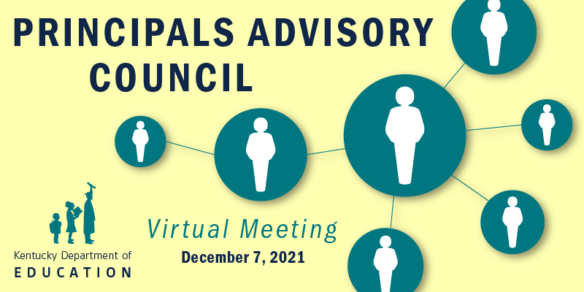
The Kentucky Department of Education’s (KDE’s) Principals Advisory Council (PrAC) heard about new statewide family engagement resources during its virtual meeting on Dec. 7.
Brooke Gill, the family engagement director for the Prichard Committee, shared the Kentucky Collaborative for Families and Schools’ new resources on family engagement. The resources were released on Nov. 15 as a part of Family Engagement in Education Week.
With more families wanting to get involved during the COVID-19 pandemic and online meetings providing families greater flexibility, Gill believes these resources are an opportunity for schools to intentionally strengthen family-school-community partnerships.
“Our big message with all of our work is that we want to think about family engagement as a relationship building process more than event attendance,” she said.
The resources were piloted from May to November with the Family Friendly Schools Learning Network, a peer learning group of 60 Kentucky schools working together to increase family engagement best practices. Based on feedback, the collaborative has highlighted on the front page of its website five user-friendly tools that received the most positive response on their helpfulness. The resources include a school self-assessment, family engagement guide, online training modules, digital playbook, and the Family Friendly School Certificate option.
Bryne Jacobs, principal of Lafayette High School (Fayette County), shared that their school has piloted the resources and is now looking at how to engage families in their student’s academic programming in a meaningful way and breakdown intimidation.
“Family engagement is one of those high-yield strategies that really can yield a lot of positive results that pertain to culture and all those things we are looking to improve [as principals],” he said. “Our parents engage, but they do it in zones that are comfortable to them, which are primarily athletics and extracurricular.”
Principal Brandy Carver of Rowan County Senior High School said they are focusing on doing things with parents instead of to them. The administration team has started the “Friday 5,” where administrators make five positive phone calls to families every Friday. Carver said their committee will start working on more ideas in January.
High-Quality Instructional Resources (HQIRs)
Professional Learning Coordinator Misty Higgins, from the KDE Office of Teaching and Learning, shared information on High-Quality Instructional Resources (HQIRs). KDE defines HQIRs as materials that are: aligned with the Kentucky Academic Standards (KAS); research-based and/or externally validated; comprehensive to include engaging texts (books, multimedia, etc.), problems and assessments; culturally relevant, free from bias and accessible for all students.
Higgins said educators need to take deliberate actions to ensure equitable access to education for all students by providing instructional resources that align to the standards and promote student equity. She took some time to explain the difference between standards, curriculum and instructional resources.
KAS, which are established at the state level, addresses the foundational framework of grade-level learning. Curriculum addresses how learning experiences are designed. The development of curriculum and resources to support the standards are designed by local school districts. Instructional resources assist student learning within the curriculum framework.
Two main resources were highlighted with the principals: the model curriculum framework, which covers how to make local curriculum that is aligned to the standards, and the High-Quality Instructional Resources webpage on the KDE website.
“We all know the need for this has been elevated because of the pandemic,” said Higgins. “We know that schools and districts have faced so many challenges when it comes to instructional resources and that the pandemic added to those challenges. In the same school year the pandemic started, the state rolled out three new sets of standards and we know that the pandemic likely hindered the school districts from even finding the time, the space or the resources to align their local curriculum and their instructional resources to those standards.”
Schools across the state applied to be a part of a pilot program where KDE will help guide them with implementing HQIRs. Starting in summer 2022, the first year will focus on reading and writing. Other content areas will be released in subsequent years.
Alison Gregory, principal for Graves County High School, said her school is immersing themselves in the process of implementing HQIRs and have applied for the pilot program. What Gregory notices her teachers struggling with the most is knowing the difference between standards, curriculum and HQIRs.
“[Teachers] are starting to understand that what they’ve been teaching for 10 years might not be as effective,” she said. “But that’s hard to let go of because your best teachers have dedicated a lot of their time and career to developing these resources.”
In other actions, the council:
- Heard from KDE Leadership Development Specialist Jenny Ray about resources from KDE to help address educator morale in schools. Ray said that the resources “aren’t meant to be a Band-Aid,” but should be used to address known needs in schools;
- Heard from KDE Leadership Development Specialist Keith Griesser about supports available to principals through the Principal Partnership Project (P3), such as the initial certification for evaluation training. Griesser said the training is free to districts and helps KDE connect to individuals just coming into the role of school administrator;
- Heard from KDE Leadership Development Specialist Stacy Noah about the KY Professional Standards for Educational Leaders (PSEL) Tool. After the state adopted the PSEL standards, a large group of stakeholders worked together over two years to create the resource. The tool provides four performance levels for each PSEL standard with possible examples of the standards in practice. Noah also asked for feedback on how more principal voice and diverse representation could be added to the tool in the next update.



Leave A Comment